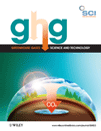
Greenhouse Gases-Science and Technology
Scope & Guideline
Transforming Insights into Actionable Strategies
Introduction
Aims and Scopes
- Carbon Capture and Storage (CCS):
Research in this area focuses on the methods and technologies for capturing CO<sub>2</sub> emissions from industrial sources and power plants, as well as the geological storage of captured CO<sub>2</sub> in various formations. - Carbon Utilization Technologies:
This includes studies on converting captured CO<sub>2</sub> into useful products, such as fuels, chemicals, and building materials, exploring new catalysts and processes for efficient conversion. - Environmental Impact Assessments:
The journal publishes research that evaluates the environmental impacts of various carbon management technologies, including lifecycle assessments and risk assessments related to CO<sub>2</sub> storage. - Modeling and Simulation of CO<sub>2</sub> Processes:
Numerical modeling and simulation studies are emphasized to predict the behavior of CO<sub>2</sub> in geological formations, assess storage capacities, and optimize capture processes. - Innovative Materials for CO<sub>2</sub> Capture:
Research on the development of new materials, such as sorbents and catalysts, that enhance the efficiency and effectiveness of CO<sub>2</sub> capture technologies. - Policy and Economic Analysis:
Exploration of the socio-economic aspects of carbon capture and storage technologies, including policy frameworks, market mechanisms, and public acceptance.
Trending and Emerging
- Hybrid and Integrated Carbon Management Solutions:
There is a growing trend towards research that combines various carbon capture, utilization, and storage (CCUS) technologies into integrated systems that enhance overall efficiency and effectiveness. - Advanced Materials and Nanotechnology:
Emerging studies focus on the development of advanced materials, including nanocomposites and metal-organic frameworks (MOFs), which show promise for improving CO<sub>2</sub> capture capabilities. - Machine Learning and Data-Driven Approaches:
Recent publications have increasingly incorporated machine learning and data analytics to optimize carbon management strategies, enhance modeling accuracy, and predict system behaviors. - Urban Carbon Management:
Research on the role of urban environments in carbon emissions and the development of localized strategies for CO<sub>2</sub> capture and reduction is gaining attention, reflecting the importance of city-level interventions. - Sustainability and Circular Economy:
An increasing number of papers are focusing on the intersection of carbon management and sustainability, exploring how carbon capture technologies can contribute to circular economy principles.
Declining or Waning
- Basic Research on CO<sub>2</sub> Chemistry:
There has been a noticeable decrease in publications focusing solely on the fundamental chemistry of CO<sub>2</sub> without direct application to capture or utilization technologies, as the field has become more application-oriented. - Conventional Solvent-Based Capture Methods:
Research centered on traditional solvent-based capture methods has waned, likely due to the increasing interest in more innovative and efficient materials and methods that reduce energy consumption and improve capture efficiency. - Single-Technology Studies:
There is a visible decline in studies that focus on isolated technologies without integrating them into broader systems or frameworks, as the field moves towards more holistic approaches that consider interdependencies and system efficiencies.
Similar Journals
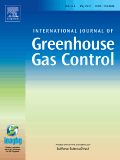
International Journal of Greenhouse Gas Control
Empowering innovation for climate resilience.The International Journal of Greenhouse Gas Control, published by Elsevier Science Ltd, serves as a premier platform for disseminating cutting-edge research on greenhouse gas management and mitigation strategies. Since its inception in 2007, this journal has made significant contributions to the fields of Environmental Science, Engineering, and Policy, boasting a remarkable Q1 status across various categories, including Energy and Pollution, as of 2023. With its focus on innovative scientific approaches and technological advances, the journal ranks among the top publications in its field, holding impressive positions such as Rank #15 in General Energy and Rank #27 in Environmental Science and Pollution. Although it follows a subscription-based model, its impact factor underscores its importance in shaping effective policies and practices that can mitigate the challenges posed by greenhouse gas emissions. Researchers, professionals, and students alike will find this journal an invaluable resource for the latest findings and discussions that drive the global agenda on climate change and sustainability.
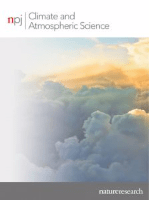
npj Climate and Atmospheric Science
Transforming insights into action for our planet.npj Climate and Atmospheric Science, published by NATURE PORTFOLIO, is a premier Open Access journal dedicated to advancing the understanding of climatic and atmospheric phenomena. Since its inception in 2018, this journal has positioned itself as a leader in its field, achieving Q1 ranking in 2023 across key categories such as Atmospheric Science, Environmental Chemistry, and Global and Planetary Change. With a Scopus rank of #23 out of 148 in Earth and Planetary Sciences and a commendable percentile ranking, npj Climate and Atmospheric Science serves as an essential platform for disseminating high-quality research, fostering interdisciplinary collaboration, and addressing critical global challenges. Its open access policy ensures that vital research findings are available to a broad audience, facilitating scholarly engagement and innovation. Researchers, professionals, and students in the fields of environmental science and climate studies will find this journal a valuable resource for cutting-edge studies and transformative insights.
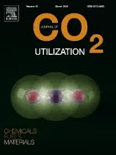
Journal of CO2 Utilization
Transforming carbon into opportunity.Welcome to the Journal of CO2 Utilization, an esteemed publication dedicated to advancing the science and technology associated with carbon dioxide conversion and utilization. Published by ELSEVIER SCI LTD in the United Kingdom, this journal has rapidly established itself as a leader in its field, boasting a prestigious Q1 ranking across multiple categories including Chemical Engineering (miscellaneous), Process Chemistry and Technology, as well as Waste Management and Disposal for 2023. Emphasizing open access since 2023, the Journal of CO2 Utilization ensures widespread dissemination of its groundbreaking research, enabling accessibility for scholars, professionals, and students alike. With a focus on innovative strategies for carbon capture and sustainable environmental practices, this journal is imperative for researchers looking to contribute to the global efforts in mitigating climate change while promoting eco-friendly technologies. Join us in this critical exploration of CO2 utilization from 2013 to 2024 and be part of a community that champions impactful scientific discourse and application.

Gas Science and Engineering
Pioneering Research for a Sustainable Energy FutureGas Science and Engineering is a premier academic journal published by Elsevier, dedicated to advancing knowledge in the critical domains of energy engineering, fuel technology, and geotechnical engineering. With a notable impact factor that underscores its significance in the field, this journal provides a platform for researchers, professionals, and students to explore cutting-edge research and innovative methodologies. As evidenced by its strong performance in Scopus rankings—placing within the top quartiles for various categories—the journal is recognized for its rigorous peer-review process and commitment to open access, allowing for wider dissemination of knowledge. Based in the Netherlands, Gas Science and Engineering aims to foster collaboration and discussion among scholars and industry experts, making it an essential resource for anyone engaged in the study of gas sciences and related fields.

Journal of Climate Change
Empowering dialogue on climate challenges and solutions.The Journal of Climate Change, published by IOS PRESS, is a premier academic platform dedicated to the multidisciplinary investigation of climate change, its impacts, and mitigation strategies. With a focus on promoting innovative research, this journal aims to cultivate dialogue among researchers, policymakers, and environmental professionals globally. While the impact factor signifies its academic significance, the journal prides itself on providing unrestricted access to cutting-edge research insights, fostering collaboration within the scientific community. The journal’s ISSN is 2395-7611, and the E-ISSN is 2395-7697. Whether you are a seasoned researcher or a student exploring the critical implications of climate change, the Journal of Climate Change serves as an essential resource for the latest findings and discussions in this vital field.
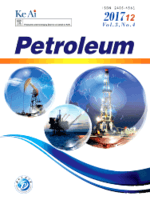
Petroleum
Exploring the depths of energy innovation and geological insights.Petroleum, an esteemed open-access journal published by KEAI PUBLISHING LTD, serves as a premier platform for disseminating high-quality research in the fields of energy engineering, fuel technology, geology, and related earth sciences. Established in 2015, the journal exemplifies innovation and scholarly rigor with a commendable ranking in the second quartile across multiple categories, including Energy Engineering and Geopolitics. With a focus on advancing knowledge and practices in the petroleum sector, it encourages submissions that encompass a broad spectrum of topics from exploration and extraction techniques to environmental impacts and sustainability measures. Based in Beijing, China, this journal's impact is further enhanced by its significant presence in the Scopus database, achieving impressive percentiles, such as the 95th for Geology and 93rd for Geochemistry and Petrology. The open-access model fosters unrestricted global collaboration and accessibility, making the latest research available to a diverse audience of researchers, professionals, and students eager to innovate and lead in the burgeoning energy landscape.

Geomechanics for Energy and the Environment
Exploring the Synergy Between Geomechanics and Energy EfficiencyGeomechanics for Energy and the Environment, published by ELSEVIER, stands as a premier journal in the fields of geotechnical engineering, Earth sciences, and risk assessment. With an impressive impact factor and ranking in the Q1 category across multiple relevant disciplines including Computers in Earth Sciences and Engineering Geology, this journal serves as a critical platform for groundbreaking research and innovation from 2015 to 2024. Located in the Netherlands, it aims to bridge the gap between geomechanics and energy solutions, making it indispensable for professionals and academics focused on sustainability and environmental impacts. Although it operates on a traditional access model, the rich and varied content published in this journal is essential for those at the forefront of research, helping to foster a deeper understanding of the interplay between geomechanical processes and environmental challenges. Your contributions to this journal not only enhance scientific dialogue but also pave the way for advancements in risk management and geotechnical practices that are crucial for the future.

Journal of Petroleum Exploration and Production Technology
Connecting Ideas and Innovations in Energy ResearchThe Journal of Petroleum Exploration and Production Technology, published by SPRINGER HEIDELBERG, is a prominent Open Access journal dedicated to advancing knowledge in the fields of energy, geotechnical engineering, and engineering geology. Since its inception in 2011, the journal has established itself as a critical platform for researchers and professionals seeking to share innovative research, methodologies, and technology developments in petroleum exploration and production. With an impressive ranking of Q2 in both the Energy (miscellaneous) and Geotechnical Engineering and Engineering Geology categories as of 2023, it attracts contributions that push the boundaries of our understanding in these essential industries. The journal is indexed in major databases, ensuring wide visibility and accessibility for its published work. The dedication to Open Access allows for unrestricted dissemination of research, promoting collaboration and knowledge transfer within the global community.

Carbon Capture Science & Technology
Driving Innovation: The Premier Journal for Carbon Capture ResearchCarbon Capture Science & Technology, published by Elsevier, is an esteemed, peer-reviewed, open access journal dedicated to advancing research in the growing fields of chemical engineering, energy, and environmental science. With an ISSN of 2772-6568, this influential journal has established itself since its inception in 2021 and continues to make notable contributions, reflected in its impressive Q1 rankings across multiple categories, including a #14 rank in Environmental Science and a #13 rank in Chemical Engineering as of 2023. The journal aims to provide a platform for the dissemination of innovative carbon capture technologies and methodologies that address vital climate challenges, ensuring broad accessibility for researchers, professionals, and students alike. By embracing open access, Carbon Capture Science & Technology fosters a collaborative approach to knowledge sharing, making it an indispensable resource for those committed to sustainability and environmental preservation.
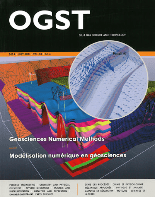
Oil & Gas Science and Technology-Revue d IFP Energies nouvelles
Unveiling Innovations for Tomorrow's Energy NeedsOil & Gas Science and Technology - Revue d'IFP Energies nouvelles, published by EDP SCIENCES S A, is a distinguished journal in the field of energy science, specifically focusing on the latest advancements in oil and gas technologies. Since its transition to Open Access in 1997, the journal has been dedicated to disseminating high-quality research that addresses the challenges and innovations inherent in energy engineering and fuels. With an ISSN of 1294-4475 and an E-ISSN of 1953-8189, this journal holds a significant position in academic circles, reflecting its contributions to sustainable energy solutions. The journal's rankings in Scopus showcase its impact, particularly in the areas of Energy Engineering and Power Technology (Rank #105/224), Chemical Engineering (Rank #131/279), and Fuel Technology (Rank #51/100). As a pivotal resource for researchers, professionals, and students, it aims to foster knowledge exchange and promote innovative technologies essential for the ongoing evolution of the energy sector.